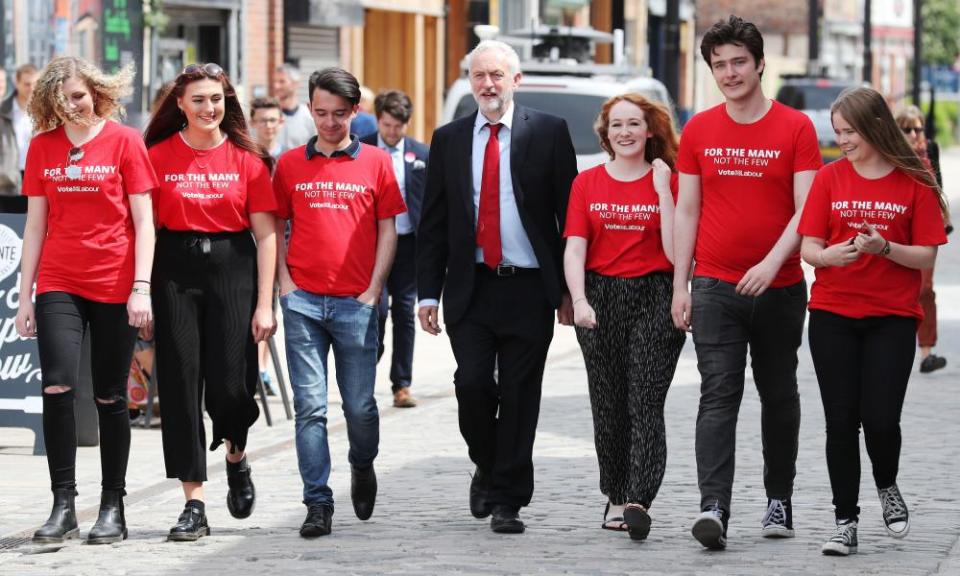Forget party loyalty, voters would rather flirt than marry | Anne McElvoy

It used to be so easy. There was Worcester woman and her public-sector cousin Holby City woman – malleable creatures for strategists hunting for swing voters. Alongside was their male avatar, Mondeo man (a coinage timed just ahead of a major Mondeo sales slump). All of these were demographic types that election planners reckoned could be pulled over the line from Tory to Labour, or vice versa, by figuring out their key concerns and pandering to them.
But the anthropology of current politics is far more muddled, and political tribes more fissile, than those heady days of Bun-the-Bakers. To the anxiety of party strategists and pollsters, human beings in 2017 are turning out to be irritatingly complex and often contradictory. This is why the result next week defies accurate prediction and is a calculated gamble for the prime minister, rather than a settled coronation.
Generational factors are one of the gremlins in the mix, to the disadvantage of old party structures. In voting intentions (as opposed to getting out there to vote) Jeremy Corbyn leads strongly in the under-40s. We do not really know whether the apparent affinity for Corbyn of female voters will pay off next week. Polling these days is often more like a flirtation than a commitment to wed.
A high single-digit lead for Theresa May would still give her a decent majority. Still, a relatively good poll number for Corbyn, compared with the prospect of an absolute wipe-out a few months ago, reflects the fissile nature of allegiances.
We see it in our own lives as well as the jagged lines of the pollsters’ graphs. Families where the norm was either Blair-ish or small-c conservative increasingly find themselves with a Corbynite in the nest, usually via their offspring and regardless of class. You’re as likely to bump into a posh Corbyn supporter these days as one sired by hardship or the trade-union movement.

This is not just a British phenomenon: centre-right parties across Europe are finding it harder to enthuse younger voters. Here, “shy Conservatives”, nodding along with anti-Tory rhetoric while ultimately voting that way, are less reliable. (A key figure in Conservative Central Office tells me that the “main blockage” the party faces is that May’s message of redistribution from the very wealthy to the “Just About Managings” is one that “comes across for the under-35s as being about mum and dad, rather than helping them”.)
Watching a focus group, I was struck that even the pledge to increase housebuilding to alleviate the property squeeze does not resonate very much. That might be because similar pledges have been made by the main parties for over a decade without a noticeable outcome. Even the Tories’ recovery in Scotland, a one-woman tribute to Ruth Davidson’s chutzpah, is down to a revival among the over-40s.
The choppy waters of Brexit add tributaries of confusion, disrupting conventional loyalties as voters toy with tactical behaviour. Urban and southern Conservatives, generally remainers, still vote Conservative. Strongly motivated leave voters in the north and east of the country, however, may feel inclined, as Ukip wilts, to veer to the Tories as the more traditionally Eurosceptic party than their old Labour allegiance.
One reason why Lynton Crosby, May’s chief strategist, is urging a return to Brexit as her core message for the campaign’s final days is that it shines a light on the other contenders – whereas arguments over funding elderly care land squarely back with the government. Crosby once told me that leaders tended to give him “a limited number of ingredients” to work with. His job was to turn these into the best available stir-fry. That is what he will continue to do, however bored we may get watching the same old wok being stirred.
A changed anthropology of politics becomes even more curious when we decode what this election actually is. Party loyalty has broken down irretrievably for Labour, causing many moderates to think of casting their vote elsewhere for the first time.
The unwinding of party loyalties benefits the SNP – which has a clear single cause at the heart of its pitch. But it means traditional political entities are stretched across a very wide spread of emotions and instincts: not so much broad churches as cacophonous ones.
Labour is really two parties now, a leftwing and a social democratic one, uneasily flat-sharing until someone moves out. Urban Conservatives who form the party elites in government often forget that their social liberalism is not so strong in the party elsewhere.
I was reminded of this gap at a shire wedding not long ago, when the talk over drinks soon fell to avoiding backsliding on Brexit, and grumbles about gay marriage being “imposed” by Cameron/Osborne. Who, I asked, was really bothered by that fait accompli? “Plenty of people here,” said my interlocutor, gesturing around contented-looking souls in the garden.
The simplicity of tub-thumbing election campaigns belies a shifting picture as we head to the polls. Those who condemn this election as dull are missing something rather big. Politics in 2017 has never been more bemusing and surprising – nor more telling about our paradoxical desires.

 Yahoo News
Yahoo News 
